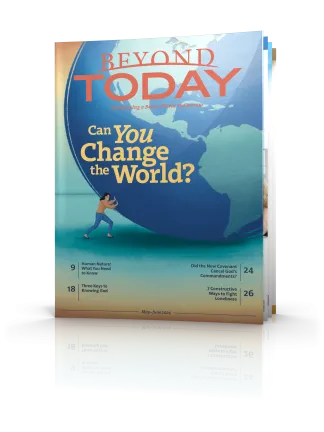Can You Change the World?

The big problems of today’s world provoke fear for the future. Can you really do anything about these looming issues? Here are practical steps you can take to change your world—and prepare to change tomorrow’s world.
Much of life today seems beyond our control, with the world heading into worsening times. Each day brings news of some big event that impacts us—if not directly, at least weighing us down with serious concerns about the future. War continues in the Middle East and Ukraine. The Hamas atrocities against Israelis were shocking and horrifying. Israeli retaliation brought more scenes of suffering and death. Russia’s invasion of Ukraine has ripped apart lives and threatens other European states. But what can we really do? Initial shock and prayers for peace give way to trying to get on with normal lives.
But that can be hard when we think more about it. The possibility of nuclear arms in these conflicts adds another present threat. Our generation has not seen a nuclear weapon used on a specific population. We know of it only from the history of World War II. Yet the threat for today is real, pressing on us with real fear.
In the end, just what can you, as an individual, do about these things? Nothing, it seems. Such matters are beyond our power to control or influence. So is there anything you can do to bring needed change? In noting some other worrisome issues, let’s consider steps we should take.
Debt and inflation
I read a lot about inflation eating away our savings and pushing many people to the edge of insolvency. Food and energy prices take increasing chunks of our monthly wages. The Bible talks about putting money into “a bag with holes” (Haggai 1:6)—a hole in your pocket in today’s language—as a sign of a sick and weak economy, as it is now.
Government spending is a significant contributor. America’s national debt is metastasizing into a cancer that, unless corrected, will kill us off as a people. Bear with me for some unsettling statistics.
A recent Wall Street Journal article reported that the Congressional Budget Office “forecasts that under current law the national debt [federal publicly held debt borrowed from credit markets] will grow to $48.3 trillion in 2034 from $26.2 trillion this last fiscal year—a whopping 84% increase. Debt as a share of GDP will rise to 116% in 2034 from 97.3%. As helpful historical context, the U.S. added $22.3 trillion in debt in its entire history through 2021, about as much as it’s projected to pile on over the next 10 years” (“CBO Shows the U.S. Is Paddling Toward the Fiscal Falls,” Feb. 9, 2024).
Since the majority of this spending is in entitlements and discretionary spending like Medicare and Social Security, no politician wants to be the one to reduce these items. We’re entangled in a web of spending from which there is no turning back. Any sane person looking at this picture knows it will one day kill the republic.
Look at that figure of $48.3 trillion. America is currently adding about $1 trillion in new debt every three months. No one understands how much money one trillion is, much less 48 trillion. It’s an inconceivable number. Yet it’s real, and it has consequences.
There is nothing you or I can do to correct this in our lifetime today. But there is something we can do in our own life, in our personal world. We can live within our income. We can avoid the kind of deficit spending that could push us and our family into bankruptcy or systemic generational poverty.
Sound financial management of personal income is within your means to learn, use and master. There are sound financial principles found in the Bible that form a basis for a solvent lifestyle. The Bible speaks well of the saver, noting the ant wisely stores up food for the winter (Proverbs 6:6-11). It speaks favorably of someone who would provide for his children and grandchildren: “A good man leaves an inheritance to his children’s children, but the wealth of the sinner is stored up for the righteous” (Proverbs 13:22). Of course, not everyone today has such means, but we should strive to do what we can in our given circumstances.
When we manage our money to save not just for ourselves but others, we’re practicing other spiritual principles taught in the Bible. Money does not become an obsession, a god or false idol. Having savings instead of chronic debt puts you in a position to help others who may be going through a rough period. We then become givers rather than takers. It’s far better for us to help others than always go to a friend, relative or government program for support. This pleases God, as it aligns us with His nature.
You cannot change out-of-control government spending, but you can change your own spending and reap the tangible blessings. In the process you will also be learning how to manage spending on a larger scale. This puts you on the track of God’s great purpose for your life should you choose to follow. More on this later.
Let’s consider another major problem we face but cannot change.
Corruption in government and leadership
It seems not a day passes without another revelation of corrupt behavior by a politician, judge, business leader, religious figure or other high-profile person. It may be salacious. And sometimes it’s criminal, such as embezzlement of funds or deliberate financial fraud. Incompetence and lying lead to public humiliation too. Sadly, we’ve come to expect nothing better from those appointed to positions of stewardship.
Isaiah’s description of such corruption fits our day: “Alas, sinful nation, a people laden with iniquity, a brood of evildoers, children who are corrupters! They have forsaken the Lord, they have provoked to anger the Holy One of Israel, they have turned away backward. Why should you be stricken again? You will revolt more and more. The whole head is sick, and the whole heart faints. From the sole of the foot even to the head, there is no soundness in it, but wounds and bruises and putrefying sores; they have not been closed or bound up, or soothed with ointment” (Isaiah 1:4-6).
Shock at the corruption leads to discouragement and gives way to cynicism and a breakdown of trust. But what can you do about it? Elect a righteous congressman, governor or president?
Years ago I heard it said that if you could find a person with the wisdom of Solomon, the patience of Job, the integrity of Joseph and the righteousness of Jesus Christ, such would be worthy of high political office. Perhaps there’s someone today with high integrity and capability, but such a person running for office would still be attacked, hindered and destroyed by the system.
The point, again, is that we will not be able to change this—but we can make choices to change ourselves. And that’s what God wants you to do. He wants you to start changing yourself to be like these figures from the Bible. That’s why the record of their lives is preserved—to be an example to us of how to live, not just for today but for eternity in the family of God (1 Corinthians 10:11).
We cannot change the world, but we can change our world. We cannot solve these large problems through activism or our engagement and intention to help. Don’t misunderstand. Where we can engage and make a difference, we should. But it’s far more important we come to see that we can start changing ourselves and begin a life of preparation for the world to come. This is God’s intent.
Working with what you’re given
It’s described in a parable Jesus gave for His disciples through the ages—the parable of the pounds or minas in Luke 19. In it a man gives to each of 10 of his servants the same amount of money, amounting to about three month’s salary, telling them to use this to “do business” until he returns (verse 13). And on returning he demands an accounting showing how much each servant had increased his master’s investment.
The first servant increased his amount by 10 times. The nobleman (representing Christ in the story) rewarded him with authority over 10 cities. The second increased his amount by five times. He received the promise of five cities. Then came another who had done nothing with his money. He had wrapped it in a cloth and hidden it away, not even putting it out for loan in the bank to gain a bit of interest. His amount was taken away and given to the first servant.
Jesus is here using money as an example of spiritual growth. The money and opportunity given here represent living within your means and using what you’ve been given to grow in knowledge, character and experience—in short, making changes in life and becoming a productive and profitable servant. This parable gives us clear and direct help in dealing with the monumental challenges confronting this present world. We cannot change this world. Only Jesus at His return will bring lasting change through the Kingdom of God, which will replace the kingdoms of this world (Revelation 11:15).
The parable tells us we can work to change ourselves and our circumstances as part of preparing to rule with Christ in His Kingdom. Get your financial life in order, live by God’s financial teaching—this applying to all areas of your life—and you will be able to manage the affairs of many people in the coming Kingdom. Live within your means and avoid crippling debt and you in your personal “city” will develop spiritual priorities enabling you to manage the larger affairs of multiple cities. Lay up an inheritance as you’re able, and you will know how to implement policies that enhance the lives of those who will live in those cities.
This is why you were born
This life is preparation for a coming world where righteousness reigns. If you today develop the wisdom of Solomon, your judgments, properly used, will bring stability to your life and your family. If you build the spiritual fruit of patience, like Job, you will not be tossed about by the currents of problems in the world that could shipwreck your personal life.
If you live with the integrity of a Joseph in your thoughts and actions, you will find inner peace and calm and will rise above the stress of life, able to avoid temptation and secure in the knowledge that God guides your life despite what everyone else does.
And by drawing near to God and continually seeking His help to become righteous like Jesus Christ (Matthew 5:48; 6:33), you can live and reign with Christ and assist in the coming transformation of the entire world (Revelation 20:6).
You cannot change the world at large—yet. But you can change yourself. Change is difficult. Well-meaning resolutions in January are not enough. It takes much more. Change is something God wants us to do. But He doesn’t expect us to do it alone. Neither does He expect us to rely on a lot of self-help ideas and techniques. God wants us to live successful, positive lives, and He promises us the help we need to transform our lives into the vibrant happy lives we desire but often find so elusive.
All change begins in our mind and heart—where we consider our lives and what we do. When we’re aligned with the mind of God, the power of God, we can expect to produce change that endures. Change that leads to a Spirit-led life with real meaning and purpose!







